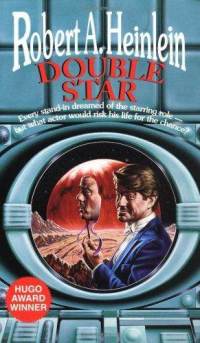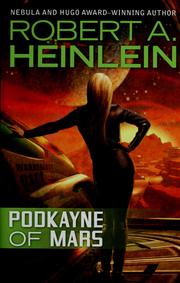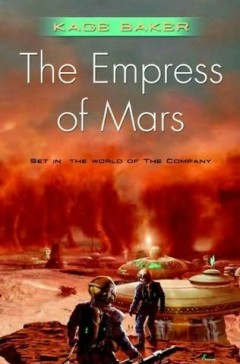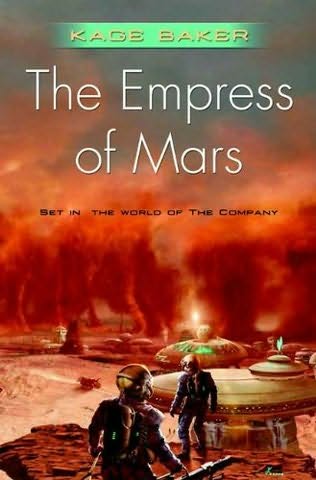
Robert Heinlein’s first Hugo Award winner was Double Star, a work that garners him far less attention today than his other Hugo winners. A reading of the novel will make obvious the reason for this: it is simply not as good. This is not to say that the book is poor, but for it to have won the Hugo Award in 1956, one must suppose either that it was a weak year for science fiction or that giving it the award was a mistake, akin to giving the Oscar to American Beauty or Shakespeare in Love.
It is something of a mystery to me why the novel does not amount to much. The protagonist has a distinct and interesting personality and the idea for the story holds promise. The prose is spare but efficient as you would expect from a Heinlein piece. What went wrong is that the plot is underdeveloped, a fault that would seem to be easily avoided, especially with a veteran author if he cares enough to put the effort into it. A writer needs to squeeze out of a story idea its potential, like one wrings the juice from an orange, and this is not achieved in Double Star. Given that The Puppet Masters came out a few years earlier, its weakness cannot be explained by an author who had yet to come into his own as a storyteller.
The main character is Lorenzo Smythe, an actor in the middle of some lean times but who preserves his pride and thespian affectation, though not to the point of becoming a caricature. He is offered a top secret job to impersonate a kidnapped Martian politician, Joseph Bonforte, until the man can be recovered. At stake is the peaceful equilibrium of human society.
[continue reading…]
Help Promote Prometheus Unbound by Sharing this Post

 When Robert Heinlein told a tale, it was with a compelling and engrossing voice. He created personalities with interest and depth and fashioned dramatic interactions to keep us involved. However much or little happens to his characters, the experience for us readers is enhanced because we become invested in the people who inhabit his stories. Even a book like Podkayne of Mars, which one might quibble is a touch underplotted, is a satisfying read because of the investment in the people.
When Robert Heinlein told a tale, it was with a compelling and engrossing voice. He created personalities with interest and depth and fashioned dramatic interactions to keep us involved. However much or little happens to his characters, the experience for us readers is enhanced because we become invested in the people who inhabit his stories. Even a book like Podkayne of Mars, which one might quibble is a touch underplotted, is a satisfying read because of the investment in the people.
Podkayne Fries, a girl on the verge of womanhood with dreams of becoming an interplanetary ship captain, is the principle narrator and protagonist of the story. She and her younger brother Clark get an opportunity to accompany their uncle on a voyage to Venus and Earth. Her uncle, however, is an ambassador and there are those who would interfere with his mission, disdaining no despicable act in their attempts. That is about all there is to the story structure. There are a few plot points thrown in – such as the mysterious object Clark smuggles on board, or the solar storm that catches them between planets – and the ending is harrowing, but it becomes clear early on that the novel’s strongest points lie elsewhere.
[continue reading…]
Help Promote Prometheus Unbound by Sharing this Post

 The Empress of Mars
The Empress of Mars
By Kage Baker
Trade paperback, 304 pages
Tor (2009), $10.87
The Empress of Mars was written by the late Kage Baker (June 10, 1952 — January 31, 2010; 1st name pronounced like ‘cage’). It started out as a novella (Asimov’s Science Fiction Magazine July 2003), which won the 2004 Theodore Sturgeon Award and was nominated for a Hugo Award and a Nebula Award, but was later expanded into the full-length novel published in 2009 that I review here.
The Empress of Mars is not Martian royalty. This is not Barsoom, the Mars of Edgar Rice Burroughs. You won’t find a John Carter-type hero fighting native Martians and rescuing princesses within these pages, though Baker does pay homage to Burroughs’ Mars tales. Tars Tarkas makes an appearance as the Martian Santa Claus, for example.
No, The Empress of Mars is a restaurant and bar owned by one Mary Griffith, an early settler of Mars and former biological scientist. A tough, motherly figure, Mary Griffith embodies the rugged individualism and pioneer spirit that pervades Baker’s The Empress of Mars. Baker’s tale is more scientifically literate than Burroughs’, and qualifies (mostly at least, see below) as hard science fiction, leavened with superior writing and humor. It is set some unspecified time after the year 2186 — marking a past event, the year the Kutuzov expedition discovered Olympus Mons is not an extinct shield volcano, it was the only date I recall seeing in the novel.
The story revolves around Mary, her three daughters, and a host of other quirky characters, some of whom she takes under her wing, others she befriends or does business with, as they deal with at first neglect by and then interference from the bureaucrats of the British Arean Company (BAC).
[continue reading…]
Help Promote Prometheus Unbound by Sharing this Post

Are there any major differences between American and British science fiction (SF)? If so, what are they and what is the reason for them? What the heck does this have to do with libertarianism?
[continue reading…]
Help Promote Prometheus Unbound by Sharing this Post














